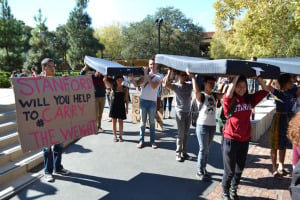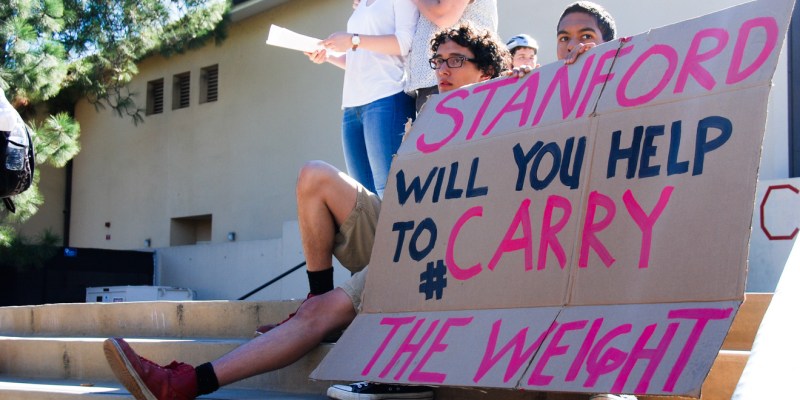More than 130 people participated in a demonstration called “Carry that Weight” in White Plaza on Wednesday. Students were urged to carry a pillow or mattress around for a day to symbolize the burden placed upon survivors of sexual assault.

The protest was intended to show solidarity with survivors of sexual assault and to urge the Stanford administration to change its policies related to sexual assaults. After hearing several speeches, many of the demonstrators marched to the Main Quad.
According to one of the event organizers, Lina Garcia Schmidt ’15, the event was held in solidarity with Emma Sulkowicz, a Columbia student who is carrying a mattress around until her alleged rapist is expelled.
“Today we are carrying mattresses across campus,” said demonstrator Elliot Bomboy ’17. “Mattresses are really heavy. I carried one here from Terra, but the thing is that I would rather carry that mattress to all of my classes everywhere and every day than have to put up with this for one more minute.”
Goals of the demonstrators included, according to literature they handed out, “mandatory, evidence-based education initiatives” and “expulsion as a default sanction for students found responsible of sexual assault.”
These stated goals differ from the University’s current Alternate Review Process (ARP), which currently states that students will be “disciplined under the Guide to the Penalty Code of the Office of Community Standards.” Expulsion is listed as a possible but not automatic outcome.
Schmidt called on Stanford to “enact real punishments for offenders of sexual assault” and criticized Stanford for allowing one student found responsible for rape to be suspended rather than expelled.
“It sends the message that sexual assault is acceptable,” Schmidt said.
She added that she supports mandatory expulsion for perpetrators of sexual assault and that she believes the ARP’s current burden of proof for conviction — a preponderance of evidence — should not be increased.
“There’s a lot of misinformation about rape… there are statistics that show that false accusations of rape are incredibly rare, the standards of proof that Stanford have are, I believe, adequate,” Schmidt said.
However Elisabeth Dee ’16, another event organizer, called on the ARP to actively reduce the burden of proof required to find someone guilty of sexual assault.
“The Alternate Review Process puts so much emphasis on the burden of proof, but it doesn’t take into account discrimination or hate against people of all identities,” she said. “[The ARP] should be focusing more on that… not defending the perpetrator, because essentially burden of proof is a defense of the perpetrator.”
Dee added that it is often hard to collect physical evidence of rape, and said that proving that a rape has taken place can be traumatic.
“Having to prove yourself, for me, was like being raped all over again,” she said. “No one should have to go through that. You should take people at their word because nobody would lie about this kind of painful experience.”
Pleased with the turnout at the event, Dee said she saw the protest on Wednesday as part of an ongoing series of actions seeking change from the Stanford administration. In an interview after the protest, Dee was critical of the administration’s handling of sexual assault with respect to intersectional identity.
“The most important things [the Stanford administration] can do is recognize the diverse voices speaking out on this topic,” Dee said. “Right now… they’re not recognizing any intersectional identities, and that’s not the right way to approach it; that’s a completely ineffective way to approach it.”
Alona King ’17, a demonstrator at the protest, wanted Stanford to take more action on the issue of sexual assault. King was pleased that the Black community was participating in the demonstration and criticized the University’s handling of sexual assault cases.
“It’s important to represent those who have historically been silenced in this conversation,” King said. “In the history of the University, only one person has been expelled for sexual assault, and that’s wrong. So I think I would like to see the University act more and talk less, if you will, and actually give the [Provost’s] task force power to do something and not worry so much about [Stanford’s] image.”
Benjy Mercer-Golden ’15, another participant in the protests, a member of the Provost’s Task Force on Sexual Assault Policies and Practices and a member of the ASSU Cabinet, urged Stanford to pay better attention to its students.
“I think the University has an obligation to listen to what its students are saying,” Mercer-Golden said.
He added that he believes it is important for adult support staff and the Stanford faculty as a whole to reflect the diversity of Stanord students.
“There should be diversity of background and thought for anyone who is tasked with support [for survivors of sexual support],” Mercer-Golden said.
Sammie Wills ’16, a speaker at the rally from the Stanford Asian American Activism Committee, called on Stanford to increase diversity in the faculty, saying that too many faculty members didn’t understand students.
“Hiring faculty on this campus who do teach, mentor and support students can no longer be optional,” Wills said. “We need strong voices who will not only research but who will also be out here at these rallies just like this and in the faculty meetings and with their colleagues, advocating for and with us.”
At the end of the demonstration, the protest organizers invited people to go to the Women’s Community Center from 1 to 3 p. m. to talk more about the issue of sexual assault.
In an email to The Daily, Catherine Criswell, Stanford’s Title IX coordinator wrote: “I know that I speak for the University when I say we support freedom of expression and speech and our students’ choice to actively demonstrate support and solidarity for sexual assault survivors.”
Angelique Dakkak contributed to this article.
A previous version of this article referred to the protest as “Carry the Weight” instead of “Carry that Weight.” The headline of this article has also been changed to better reflect the demands of the demonstrators. The Daily regrets these errors.
Contact Caleb Smith at caleb17 ‘at’ stanford.edu.
